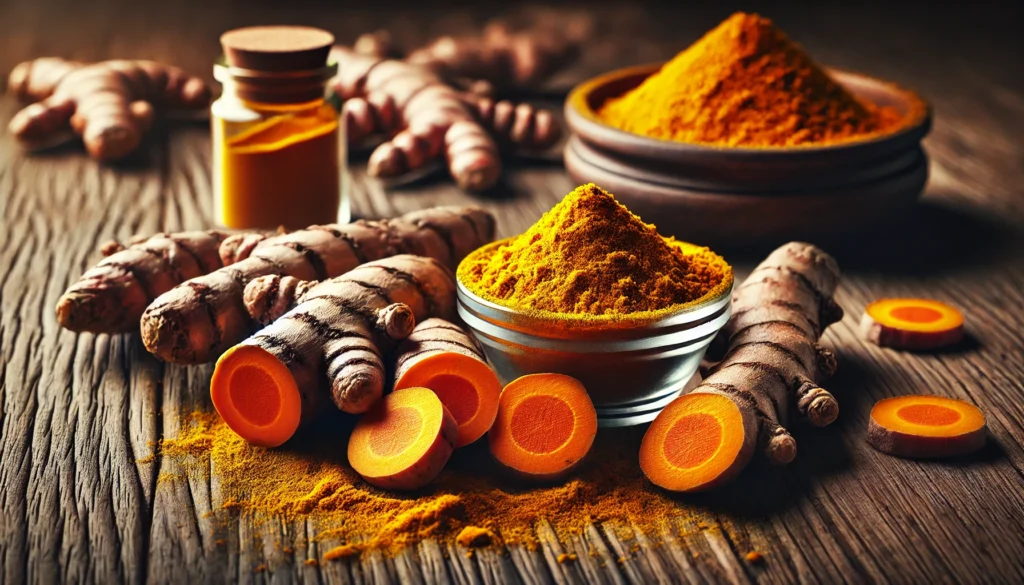Turmeric, derived from the Curcuma longa plant, is renowned for its vibrant colour, distinctive flavour, and centuries of use in traditional medicine. Modern research has highlighted its active compound, curcumin, for its potential health benefits, ranging from supporting joint health to promoting overall well-being.

Potential Health
Benefits of Turmeric
Anti-Inflammatory and Antioxidant Properties
Curcumin is a powerful antioxidant that helps combat oxidative stress, a key driver of chronic diseases. Its anti-inflammatory effects may also help reduce inflammation, which is linked to conditions like arthritis, metabolic syndrome, and cardiovascular disease.
Supports Joint Health
Turmeric is often used to support joint comfort and mobility. Studies suggest that curcumin can help alleviate symptoms like pain and stiffness by targeting inflammatory pathways, making it a natural option for those managing joint health.
Heart Health Benefits
Research indicates curcumin may improve heart health by supporting endothelial function, which is essential for regulating blood flow and blood pressure. Its antioxidant properties further protect against damage caused by oxidative stress, promoting overall cardiovascular health.
Cognitive Support
Emerging evidence suggests that curcumin can cross the blood-brain barrier, where it may help reduce inflammation and oxidative damage. These effects are being studied for their potential to support memory and cognitive function and reduce the risk of neurodegenerative conditions.
Why Turmeric Extract Outshines Powder
While turmeric powder is a popular spice in cooking, its curcumin content is naturally low, comprising only 3–5% of its weight. This means that large quantities of turmeric powder are required to match the curcumin levels found in concentrated extracts.
Turmeric Extract, standardised to contain 95% curcuminoids, offers a far more potent an
d consistent source of curcumin. For example:
- A teaspoon of turmeric powder may provide only a small fraction of curcumin.
- A single dose of turmeric extract delivers concentrated curcumin, maximising its health benefits.
Enhancing Absorption
Curcumin is poorly absorbed by the body. To address this, high-quality formulations often include black pepper extract (piperine), which enhances absorption by up to 2,000%. Consuming turmeric with healthy fats can also improve its bioavailability, as curcumin is fat-soluble.
Incorporating Turmeric into Your Routine
- Culinary Use: Turmeric’s warm, earthy flavour makes it a staple in dishes like curries, soups, and teas. However, its curcumin content in culinary amounts is minimal, limiting its therapeutic potential.
- Supplements: For those seeking targeted health benefits, turmeric extract supplements are a convenient and effective solution. Look for products that are standardised for curcumin content and include bioavailability enhancers like piperine.
Why VitaV Stands Out
At VitaV, we prioritise transparency and efficacy in every product. Our turmeric-based supplements use standardised turmeric extracts with 95% curcuminoids, ensuring maximum potency and bioavailability. Unlike products that rely on raw turmeric powder or unverified extracts, our formulations deliver consistent, science-backed support.
Experience the difference of premium turmeric supplementation with VitaV and take the next step towards a healthier, more vibrant life.
Potential Side Effects and Advisory Notes
While turmeric is generally safe, it’s essential to use it responsibly. Potential side effects include:
- Mild digestive issues, such as nausea or bloating.
- Increased bleeding risk for those on blood-thinning medications.
- Allergic reactions in rare cases.
- Exacerbation of gallbladder or kidney stone issues in susceptible individuals.
Who May Need to Exercise Caution?
- Pregnant or breastfeeding women may wish to avoid high-dose turmeric supplements unless recommended by a healthcare provider.
- People on medications, particularly anticoagulants or drugs for acid reflux, are advised to consult a doctor before use.
- Those planning surgery might consider pausing turmeric supplementation in advance, as it may affect blood clotting. Discussing this with a healthcare provider can help ensure safety.
Advisory Note: It is always recommended to consult a healthcare provider before starting any supplement, particularly if you have underlying conditions or take medications. Following the recommended dosage helps minimise potential side effects.
References
- Hewlings, S. J., & Kalman, D. S. (2017). Curcumin: A Review of Its’ Effects on Human Health. Foods, 6(10), 92. PMID: 29065496
- Kunnumakkara, A. B., Bordoloi, D., Padmavathi, G., et al. (2017). Curcumin, the golden nutraceutical: Multitargeting for multiple chronic diseases. British Journal of Pharmacology, 174(11), 1325–1348. PMID: 27638428
- Gupta, S. C., Patchva, S., & Aggarwal, B. B. (2013). Therapeutic roles of curcumin: lessons learned from clinical trials. The AAPS Journal, 15(1), 195–218. PMID: 23143785
- Nelson, K. M., Dahlin, J. L., Bisson, J., et al. (2017). The essential medicinal chemistry of curcumin. Journal of Medicinal Chemistry, 60(5), 1620–1637. PMID: 28074653
